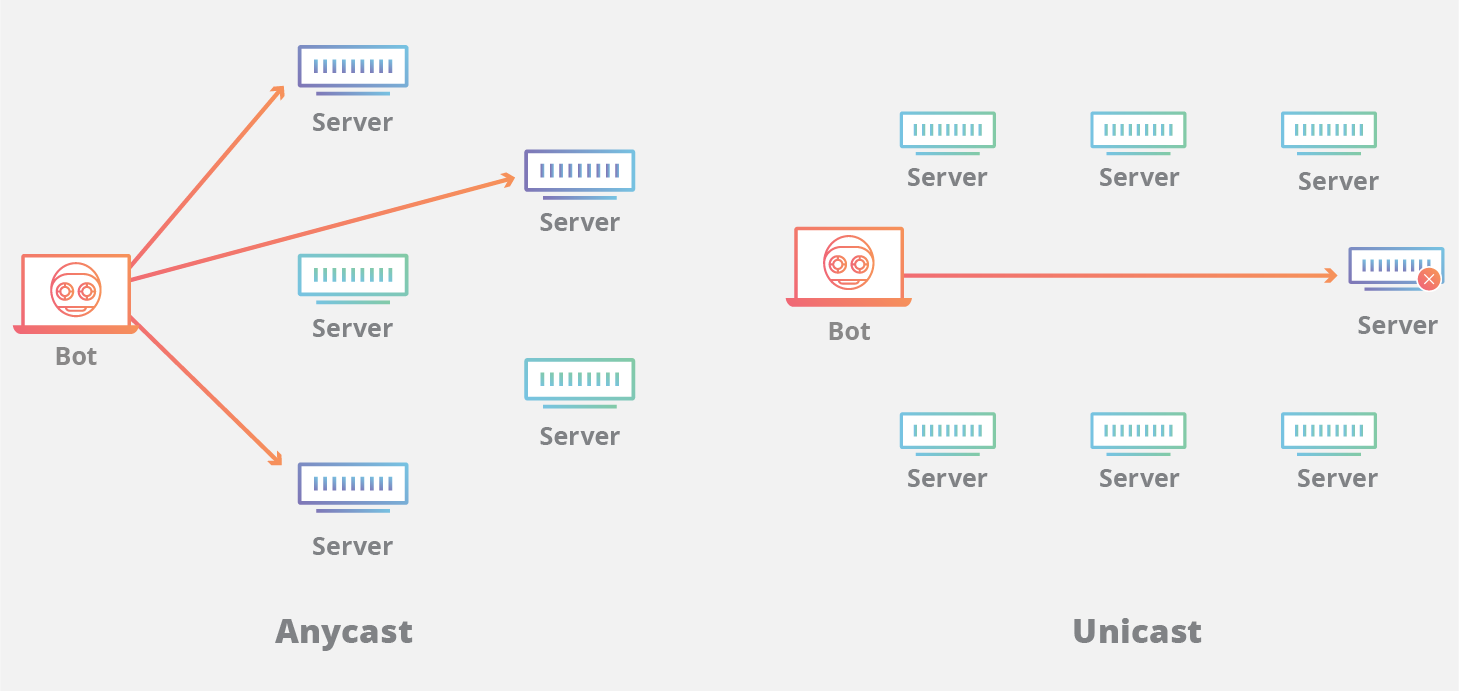Anycast is a network addressing and routing methodology used in computer networks to provide a single destination address for multiple servers. In the context of Anycast, a single IP address is assigned to multiple servers or network nodes that are geographically dispersed. When a client sends a request to the Anycast IP address, the routing infrastructure directs the request to the nearest or most optimal server based on various factors such as network topology, latency, or routing metrics.
Anycast is a network addressing and routing method in which incoming requests can be routed to a variety of different locations or “nodes.” In the context of a CDN, Anycast typically routes incoming traffic to the nearest data center with the capacity to process the request efficiently. Selective routing allows an Anycast network to be resilient in the face of high traffic volume, network congestion, and DDoS attacks.

Anycast is a network addressing and routing methodology in which a single IP address is shared by devices (generally servers) in multiple locations. Routers direct packets addressed to this destination to the location nearest the sender, using their normal decision-making algorithms, typically the lowest number of BGP network hops. Anycast routing is widely used by content delivery networks such as web and name servers, to bring their content closer to end users.
Key characteristics of Anycast include:
- Single IP Address: Anycast uses a single IP address to represent a service or resource, making it easy for clients to connect without needing to know the specific server’s address.
- Geographic Distribution: Anycast nodes are strategically located in different geographic locations or data centers. The routing infrastructure ensures that the client’s request is directed to the nearest node in terms of network proximity.
- Load Balancing: Anycast provides a form of automatic load balancing. When multiple nodes share the same Anycast IP address, the routing system naturally distributes incoming requests across these nodes. This helps in spreading the load and preventing any single server from becoming overwhelmed.
- Fault Tolerance: Anycast enhances fault tolerance by allowing traffic to be automatically redirected to the next nearest node if one node becomes unreachable or experiences issues. This improves the overall reliability and availability of the service.
- Scalability: Anycast is scalable since new nodes can be added to the network without requiring changes to the client’s configuration. The addition of more nodes can help distribute the load more efficiently.
Anycast is commonly used in various network applications, including content delivery networks (CDNs), Domain Name System (DNS) infrastructure, and Distributed Denial of Service (DDoS) mitigation. For example, in DDoS mitigation, Anycast can be employed to distribute attack traffic across multiple servers or data centers, making it more challenging for attackers to concentrate their efforts on a single target.
How Does Anycast Work ?
Anycast works by associating a single IP address with multiple servers or network nodes distributed across different geographic locations. When a client sends a request to the Anycast IP address, the routing infrastructure directs the request to the nearest or most optimal server based on certain criteria. Here’s a step-by-step explanation of how Anycast works:
- IP Address Assignment:
- Multiple servers or network nodes are assigned the same Anycast IP address. This IP address represents a particular service, resource, or domain.
- Geographic Distribution:
- These servers are strategically located in different geographic locations or data centers. The goal is to have them distributed across a wide area to reduce latency and improve performance for users.
- Routing Decision:
- When a client sends a request to the Anycast IP address, the request is initially directed to the client’s nearest routing infrastructure (e.g., a router or a switch).
- Routing Metrics:
- The routing infrastructure determines the optimal destination for the request based on various metrics, which may include network topology, latency, routing cost, or other performance-related factors.
- Nearest Server Selection:
- The routing system directs the request to the nearest (in terms of network proximity) server or node that shares the Anycast IP address. This is achieved by choosing the server with the shortest routing path or lowest routing cost.
- Load Balancing:
- Anycast provides a form of automatic load balancing. Since multiple servers share the same Anycast IP address, the routing infrastructure naturally distributes incoming requests across these servers. This helps balance the load and prevents any single server from becoming overwhelmed.
- Response to Changes:
- If a server becomes unreachable or experiences issues, the routing infrastructure automatically redirects traffic to the next nearest server. This enhances fault tolerance and ensures continuity of service.
- Scalability:
- Anycast is scalable. New servers or nodes can be added to the network without requiring changes to the client’s configuration. This makes it easy to scale the infrastructure as needed.
